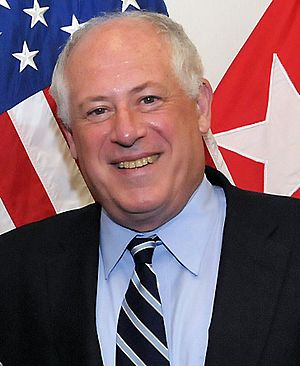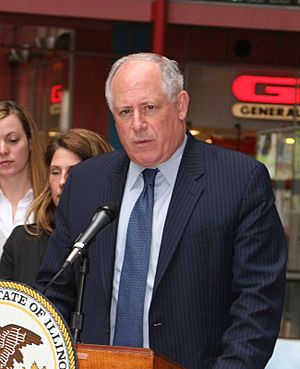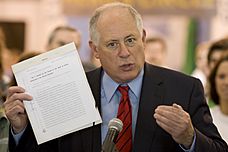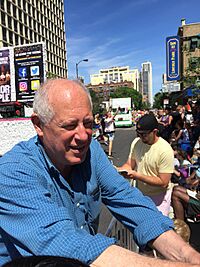Pat Quinn (politician) facts for kids
Quick facts for kids
Pat Quinn
|
|
|---|---|

Quinn in 2013
|
|
| 41st Governor of Illinois | |
| In office January 29, 2009 – January 12, 2015 |
|
| Lieutenant | Vacant (2009–2011) Sheila Simon (2011–2015) |
| Preceded by | Rod Blagojevich |
| Succeeded by | Bruce Rauner |
| 45th Lieutenant Governor of Illinois | |
| In office January 13, 2003 – January 29, 2009 |
|
| Governor | Rod Blagojevich |
| Preceded by | Corinne Wood |
| Succeeded by | Sheila Simon |
| 70th Treasurer of Illinois | |
| In office January 14, 1991 – January 9, 1995 |
|
| Governor | Jim Edgar |
| Preceded by | Jerome Cosentino |
| Succeeded by | Judy Baar Topinka |
| Commissioner of the Cook County Board of Appeals | |
| In office 1982–1986 |
|
| Preceded by | Seymour Zaban |
| Succeeded by | Wilson Frost |
| Personal details | |
| Born |
Patrick Joseph Quinn Jr.
December 16, 1948 Chicago, Illinois, U.S. |
| Political party | Democratic |
| Spouse |
Julie Hancock
(m. 1982; div. 1986) |
| Children | 2 (Patrick and David) |
| Education | Georgetown University (BSFS) Northwestern University (JD) |
| Signature | |
Patrick Joseph Quinn (born December 16, 1948) is an American politician. He served as the 41st Governor of Illinois from 2009 to 2015. He is a member of the Democratic Party.
Quinn started his career as an activist. He founded the Coalition for Political Honesty. This group used citizen ideas to push for political changes. Before becoming governor, he held several important jobs. He was a commissioner on the Cook County Board of (Property) Tax Appeals from 1982 to 1986. He also served as Illinois State Treasurer from 1991 to 1995. Later, he was the 45th Lieutenant Governor of Illinois from 2003 to 2009.
Quinn was born in Chicago, Illinois. He went to Georgetown University and Northwestern University School of Law. He began his political work helping Illinois Governor Dan Walker. He then led citizen efforts, like the 1980 Cutback Amendment. This amendment reduced the size of the Illinois House of Representatives. It was the first time Illinois voters used a petition to change the state's constitution.
In 2009, Quinn became governor. This happened after Governor Rod Blagojevich was removed from office. Quinn won a full term as governor in 2010. During his time in office, he worked on many important issues. These included allowing voters to remove a governor from office. He also passed a large construction plan and made ethics reforms. Quinn legalized civil unions and same-sex marriage in Illinois. He also expanded healthcare access and ended the death penalty in the state.
Contents
Early Life and Education
Pat Quinn was born on December 16, 1948. His parents were Patrick Joseph "P. J." Quinn and Eileen Prindiville. Both of his parents grew up in Chicago.
Quinn's father, P. J. Quinn, joined the U.S. Navy during World War II. He served for over three years. After the war, he went to DePaul University using the G.I. Bill. He worked for the Catholic Cemeteries of Chicago for 40 years.
Eileen Prindiville was born before women could vote in the U.S. She worked as an assistant principal for many years. Pat's parents raised him and his two brothers, Tom and John, in Hinsdale, Illinois.
Quinn went to St. Isaac Jogues for elementary school. He then attended Fenwick High School. He was the cross-country team captain and sports editor for the school newspaper. In 1971, he graduated from Georgetown University. He earned a degree in Foreign Service.
Later, in 1980, Quinn earned a law degree from Northwestern University School of Law. His brothers, Tom and John, also had successful careers. Tom became an attorney, and John was a history teacher and basketball coach at Fenwick High School.
Early Activism and Reforms
Before holding public office, Quinn was a strong activist. He worked for Governor Dan Walker's campaign in 1972. From 1975 to 1982, he led the Coalition for Political Honesty. This group worked to make government more fair.
In 1976, Quinn's group collected over 635,000 signatures. They wanted to end practices like politicians getting their whole year's salary at once. Their efforts led to a law change in May 1976. This law required legislators to be paid monthly after their work.
Quinn also led a campaign in 1978 to protest a large pay raise for politicians. Thousands of Illinois taxpayers sent tea bags to the governor's office. This protest helped show strong public disapproval.
The Cutback Amendment
In 1979, Quinn started a big effort for the Cutback Amendment. This change to the state constitution would reduce the size of the Illinois House of Representatives. It would go from 177 members to 118. It would also end a special voting system.
Despite efforts to make it harder, Quinn's group collected enough signatures. The Illinois Supreme Court ruled that the question could be on the ballot. On November 4, 1980, Illinois voters approved the Cutback Amendment. About 68.7% of voters said yes. This was the first and only time Illinois voters used a petition to pass a constitutional amendment.
Citizens Utility Board
In 1982, Quinn worked to create a Citizens Utility Board (CUB). This board would protect consumers from high utility bills. Many towns in Illinois supported the idea. In 1983, Governor James Thompson signed the CUB law.
This law created a group to represent utility customers. It helped them with prices and energy saving tips. Within six months, CUB had 100,000 members. They paid dues to support the group.
Political Career
Cook County Board of Appeals
In 1982, Quinn was elected as a commissioner on the Cook County Board of Appeals. This board handles property tax appeals. He won against an incumbent who was involved in a scandal. Quinn set up an ethics code for the board. He also decided not to take campaign money from tax lawyers.
Chicago Revenue Director
In 1986, Chicago Mayor Harold Washington asked Quinn to lead the city's Revenue Department. This department had faced issues with corruption. Quinn was known as a reformer. He worked to make the department fair and efficient.
Quinn found problems like favoritism and political interference. He also started a successful program to collect unpaid parking tickets. He resigned in 1987, stating he had always followed the rules.
Illinois State Treasurer
In 1990, Quinn ran for Treasurer of Illinois. He won the Democratic primary and then the general election. He promised to make the office work for consumers and taxpayers. He refused to take campaign money from banks.
As Treasurer, Quinn worked to modernize the office. He also proposed a law to stop state employees from asking for campaign money from businesses they regulate. This law, called the Illinois Inspector Misconduct Act, was finally signed in 2002.
Lieutenant Governor (2003-2009)
Quinn became Lieutenant Governor of Illinois in 2003. He ran on the same ticket as Governor Rod Blagojevich. They were reelected in 2006. As Lieutenant Governor, Quinn focused on helping consumers, protecting the environment, and supporting veterans.
After the September 11 attacks, many Illinois National Guard members were called to duty. Their families often faced financial hardship. Quinn started "Operation Homefront" to help them. He also championed the Illinois Military Family Relief Act. This law provided financial aid to military families.
Quinn was known for being careful with state money. He often paid his own expenses or stayed in budget hotels. He did not charge the state for his meals. He had a difficult relationship with Governor Blagojevich. They rarely spoke.
Governor of Illinois (2009-2015)
Becoming Governor
On January 29, 2009, Governor Rod Blagojevich was removed from office. This happened after he was impeached for misconduct. Quinn then became the Governor of Illinois.
Quinn took office during a challenging time. The state faced problems with government corruption and a difficult economy. His main goal was to bring back public trust. He wanted to make state government more honest.
Ethics Reform
Quinn worked to improve ethics in state government. He created the Illinois Reform Commission. This group suggested ways to make government more ethical.
He also signed a law that stopped elected officials from putting their names on state road signs. This was to prevent politicians from using public property for personal promotion.
Quinn had long supported the idea of recalling a governor. This means voters could remove a governor from office. In 2010, Illinois voters approved a constitutional amendment to allow this. Illinois became the 19th state to have this power.
Quinn also launched a group to investigate problems at the University of Illinois. This group found issues with favoritism in admissions. Their work led to changes in the university's leadership.
State Budget and Economy
When Quinn became governor, Illinois had serious budget problems. The state faced a large deficit due to a major economic downturn.
As governor, Quinn signed six state budgets. He cut state spending by over $5 billion. He also worked to make sure there was enough money for important services. These included education, healthcare, and public safety.
In 2009, he signed a $29 billion plan called "Illinois Jobs Now!". This plan funded construction and repairs for roads, schools, and other public projects. He also worked with President Barack Obama's economic recovery plan. He launched a program called Put Illinois to Work, which helped create jobs.
During Quinn's time in office, Illinois saw economic improvements. The unemployment rate dropped, and nearly 300,000 private sector jobs were created.
State Income Tax
In 2009, Quinn suggested raising the state's personal income tax rate. He also wanted to increase the amount of income that was not taxed.
During his 2010 election campaign, Quinn continued to support raising the income tax. He believed it was needed to fix Illinois' finances. Despite this being a difficult topic, he won the election.
In 2011, the state legislature raised the personal income tax from 3% to 5%. This was done to help balance the state budget. Quinn signed this law. He also signed laws to give tax relief to low-income families. In 2014, he suggested a tax increase on millionaires to fund education. Voters supported this idea in an advisory vote.
ComEd Rate Hike Vetoes
In 2011, a power company called ComEd pushed for a law to automatically raise utility rates. Governor Quinn vetoed this bill. He said he did not want people to be overcharged for services.
The Illinois legislature, however, voted to override his veto. This meant the bill became law anyway. Quinn also vetoed a similar bill in 2013, but his veto was again overridden.
Later investigations showed that ComEd had engaged in a bribery scheme. This was done to get support for their bills. Quinn's vetoes are now seen as strong stands against corruption.
Environment and Energy
Soon after becoming governor, Quinn reopened seven state parks. These parks had been closed by the previous governor. He also reopened 11 state historic sites.
Quinn signed laws to promote green practices in state construction. He also focused on making government more environmentally friendly. In 2014, Illinois was ranked number one in the U.S. for sustainable building design.
Quinn was praised for his environmental leadership. He helped pass laws on solar and wind energy. He also secured funding for high-speed rail. In 2010 and 2014, the Sierra Club, a large environmental group, supported Quinn. They called him "The Green Governor."
In 2012, Quinn launched a $1 billion plan to improve Illinois' water systems. This initiative helped communities get loans for drinking water and wastewater projects.
Death Penalty Abolition
On March 9, 2011, Quinn signed a bill that ended the death penalty in Illinois. He stated that it was impossible to have a perfect system without mistakes or unfairness. He believed ending it was the right and just thing to do.
Quinn's decision was supported by many, including the 14th Dalai Lama. In 2025, an email from Robert F. Prevost (who later became Pope Leo XIV) was found. In it, he praised Quinn's "courageous decision" to abolish the death penalty.
Marriage Equality
In 2013, Governor Quinn announced his support for legalizing same-sex marriage. After much discussion, he signed the Religious Freedom and Marriage Fairness Act into law on November 20, 2013. This made Illinois the 16th state to legalize same-sex marriage.
This new law gave all married couples the same rights and protections. It also protected the religious freedom of different organizations. Illinois had already legalized civil unions in 2011. This was a major step towards full marriage equality.
Military Issues
Quinn worked to support military families and veterans. He helped pass the Let Them Rest in Peace Act. This law created a privacy zone around funerals. It was designed to stop hate groups from disrupting military funerals.
In 2009, Quinn declared the last Sunday of September as Gold Star Mother's Day in Illinois. This day honors mothers whose children died while serving in the U.S. Armed Forces.
Post-Gubernatorial Activities
After leaving office, Quinn continued to work on public issues. He supported veterans and their families. He displayed an exhibit called "Portrait of a Soldier" across the state. This exhibit honored Illinois service members who died after the September 11 attacks.
Quinn also donated his personal papers to Northwestern University. These papers include many documents related to fallen service members.
In 2024, Quinn found that the state had stopped adjusting a tax exemption for inflation. This was like a hidden tax increase. His efforts led to the practice being restarted. He also opposed using taxpayer money for private sports stadiums. He pushed for a public vote on the issue in Chicago.
Quinn is a big sports fan. He supports the Chicago White Sox, Chicago Bears, Chicago Blackhawks, and Chicago Bulls. He is known as the only Illinois governor to have dunked a basketball.
Take Charge Chicago
In 2016, Quinn started "Take Charge Chicago." This effort aimed to put term limits on Chicago's mayor. It also sought to create a new Consumer Advocate position in the city.
Quinn collected many signatures for this effort. The mayor at the time, Rahm Emanuel, decided not to seek another term shortly after.
Quinn also represented people who were trying to collect signatures in public parks. He argued that these parks are places where people should be allowed to express themselves. A judge agreed, saying that the city could not stop people from collecting petitions in places like Millennium Park.
2018 Attorney General Campaign
In 2017, Quinn announced he would run for Illinois Attorney General. His campaign focused on ethics reform, consumer rights, and protecting healthcare access. He also wanted to fight against certain federal actions. He came in second place in the Democratic primary election.
Electoral History
For Illinois Attorney General
| Party | Candidate | Votes | % | |
|---|---|---|---|---|
| Democratic | Kwame Raoul | 374,667 | 30.2 | |
| Democratic | Pat Quinn | 340,163 | 27.4 | |
| Democratic | Sharon Fairley | 156,070 | 12.6 | |
| Democratic | Nancy Rotering | 115,974 | 9.3 | |
| Democratic | Scott Drury | 98,246 | 7.9 | |
| Democratic | Jesse Ruiz | 67,706 | 5.5 | |
| Democratic | Renato Mariotti | 49,891 | 4.0 | |
| Democratic | Aaron Goldstein | 37,987 | 3.1 | |
| Total votes | 1,159,701 | 100 | ||
As Governor of Illinois (with Lt. Governor)
2014
| Party | Candidate | Votes | % | |
|---|---|---|---|---|
| Republican | Bruce Rauner/Evelyn Sanguinetti | 1,823,627 | 50.27 | |
| Democratic | Pat Quinn/Paul Vallas (Incumbent) | 1,681,343 | 46.35 | |
| Libertarian | Chad Grimm/Alex Cummings | 121,534 | 3.35 | |
| Write-In | Various candidates | 1,186 | 0.03 | |
| Majority | 142,284 | 3.92% | ||
| Total votes | 3,627,690 | 100 | ||
| Republican gain from Democratic | ||||
| Party | Candidate | Votes | % | |
|---|---|---|---|---|
| Democratic | Pat Quinn (Incumbent) | 321,818 | 71.94 | |
| Democratic | Tio Hardiman | 125,500 | 28.06 | |
| Total votes | 447,318 | 100 | ||
2010
| Illinois gubernatorial election, 2010 | |||||
|---|---|---|---|---|---|
| Party | Candidate | Votes | % | ±% | |
| Democratic | Pat Quinn (Incumbent) | 1,745,219 | 46.79% | -3.00% | |
| Republican | Bill Brady | 1,713,385 | 45.94% | +6.68% | |
| Independent | Scott Lee Cohen | 135,705 | 3.64% | ||
| Green | Rich Whitney | 100,756 | 2.70% | -7.66% | |
| Libertarian | Lex Green | 34,681 | 0.93% | ||
| Majority | 31,834 | 0.85% | -9.68% | ||
| Turnout | 3,729,989 | ||||
| Democratic hold | Swing | ||||
| Party | Candidate | Votes | % | |
|---|---|---|---|---|
| Democratic | Pat Quinn (Incumbent) | 462,049 | 50.46 | |
| Democratic | Dan Hynes | 453,677 | 49.54 | |
| Total votes | 915,726 | 100.00 | ||
As Lt. Governor (with Governor)
- 2006 Election for Governor/Lieutenant Governor of Illinois
- Rod Blagojevich/Pat Quinn (D) (inc.), 49.79%
- Judy Baar Topinka/Joe Birkett (R), 39.26%
- Rich Whitney/Julie Samuels (Green), 10.36%
- 2002 Election for Governor / Lieutenant Governor
- Rod Blagojevich/Pat Quinn (D), 52%
- Jim Ryan/Carl Hawkinson (R), 45%
For United States Senate
| Party | Candidate | Votes | % | |
|---|---|---|---|---|
| Democratic | Dick Durbin | 512,520 | 64.87% | |
| Democratic | Pat Quinn | 233,138 | 29.51% | |
| Democratic | Ronald F. Gibbs | 17,681 | 2.24% | |
| Democratic | Jalil Ahmad | 17,211 | 2.18% | |
| Democratic | Paul H. D. Park | 9,505 | 1.20% | |
| Total votes | 790,055 | 100 | ||
For Illinois Secretary of State
General election
| Party | Candidate | Votes | % | |
|---|---|---|---|---|
| Republican | George H. Ryan (incumbent) | 1,868,144 | 60.48 | |
| Democratic | Pat Quinn | 1,182,629 | 38.29 | |
| Libertarian | Joseph Schreiner | 38,074 | 1.23 | |
| Total votes | 3,088,847 | 100 | ||
Democratic primary
| Party | Candidate | Votes | % | |
|---|---|---|---|---|
| Democratic | Pat Quinn | 641,787 | 70.54 | |
| Democratic | Denny Jacobs | 141,058 | 15.51 | |
| Democratic | Rose-Marie Love | 126,939 | 13.95 | |
| Total votes | 909,784 | 100 | ||
For state treasurer
| Party | Candidate | Votes | % | |
|---|---|---|---|---|
| Democratic | Patrick Quinn | 1,740,742 | 55.70 | |
| Republican | Greg Baise | 1,384,492 | 44.30 | |
| Write-in | Paul Salander | 55 | 0.00 | |
| Total votes | 3,125,289 | 100 | ||
| Party | Candidate | Votes | % | |
|---|---|---|---|---|
| Democratic | Patrick Quinn | 449,442 | 51.12 | |
| Democratic | Peg McDonnell Breslin | 429,810 | 48.88 | |
| Total votes | 879,252 | 100 | ||
| Party | Candidate | Votes | % | |
|---|---|---|---|---|
| Democratic | Jerry Cosentino | 241,006 | 30.22 | |
| Democratic | James H. Donnewald (incumbent) | 235,052 | 29.47 | |
| Democratic | Patrick Quinn | 208,775 | 26.18 | |
| Democratic | Robert D. Hart | 112,645 | 14.13 | |
| Write-in | Others | 1 | 0.00 | |
| Total votes | 797,478 | 100 | ||
See also
 In Spanish: Pat Quinn para niños
In Spanish: Pat Quinn para niños
 | Jackie Robinson |
 | Jack Johnson |
 | Althea Gibson |
 | Arthur Ashe |
 | Muhammad Ali |




